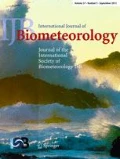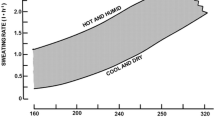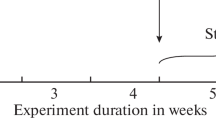Abstract
Physical work capacity (PWC180) was assessed with different levels of hypohydration in 25 heat-acclimatized male volunteers in hot dry (45°C DB, 30% RH) and hot humid (39°C DB, 60% RH) conditions equated to a heat stress level of 34°C on the WBGT scale. Heat acclimatization was carried out by exposing the subjects for 8 consecutive days in a climatic chamber with moderate work for two 50 min work cycles and 10 min intervening rest pauses. Acclimatization resulted in significant decreases in heart rate (27 bpm), oral temperature (0.8°C), mean skin temperature (1.2°C) and a significant increase in sweating rate (120 g h−1 m−2). Day-to-day variations in body hypohydration levels during heat acclimatization were not significantly different, although water intake was found to increase significantly from day 3 onwards when the subjects were in ad lib water intake state. The heat acclimatized subjects were then hypohydrated to varying degrees, viz. 1%, 2% and 3% body weight deficit, with moderate work in heat in the climatic chamber and after successful recovery from the effects of thermal stress and exercise; their physical work capacity was assessed individually. Physical work capacity was found to decrease significantly with hypohydration as compared to controls. The decrease was of the order of 9%, 11% and 22% in the hot dry condition and 6%, 8% and 20% in the hot humid condition with hypohydration levels of 1%, 2% and 3% respectively. The decrease was more pronounced during 3% hypohydration level under both heat stress conditions. This decrease was in spite of significant increases in maximal ventilation. However, the PWC180 under the two heat stress conditions, when compared, did not reveal any significant difference. It was concluded that the heat stress vehicle did not adversely affect the physical work capacity. On the other hand, the decreases in physical work capacity were found to be closely related to the primary hypohydration level in heat-acclimatized tropical subjects.
Similar content being viewed by others
Abbreviations
- WBGT :
-
wet bulb globe temperature
- bam :
-
beats per minute
- YSI :
-
Yellow Springs Instrument
- EKG :
-
electrocardiogram
References
Astrand I (1960) Aerobic work capacity in men and women with special reference to age. Acta Physiol Scand 49 [Suppl 169]:11
Bonjer FH (1968) Relationship between working time, physical working capacity and allowable caloric expenditure. Muskelarbeit Muskeltraining, Stuttgart, pp 86–89
Buskirk ER, Iampietro, PF, Bass DE (1958) Work performance after dehydration: effects of physical conditioning and heat acclimatization. J Appl Physiol 12:189–194
Cadarette BS, Sawka MN, Toner MM, Pandolf KB (1984) Aerobic fitness and the hypohydration responses to exercise heat-stress. Aviat Space Environ Med 55:507–512
Craig FN, Cummings EG (1965) Dehydration and muscular work. Physiologist 8(3):142
Dehn MM, Bruce R (1972) Longitudinal variations in maximal O2 uptake with age and activity. J Appl Physiol 33:805–807
Eichna LW, Park CR, Nelson N, Horvath SM, Palmes ED (1950) Thermal regulation during acclimatization in hot dry (desert type) environment. Am J Physiol 163:585–597
Ekblom B (1969) Effect of physical training on oxygen transport system in man. Acta Physiol Scand [Suppl 328] 1–45
Henschel A, Cole MB, Lyezkowskys O (1968) Heat tolerance of elderly persons living in a subtropical environment. J Gerontol 23:17
Hickson RC, Bomze HA, Holloszy JO (1977) Linear increase in aerobic power induced by a strenuous program of endurance exercise. J Appl Physiol 42:372–376
Holloszy JO, Coyle EF (1984) Adaptation of skeletal muscle to endurance exercise and their metabolic consequences. J Appl Physiol 56:831–838
Klausen KD, Dill DB, Phillips EE, McGregor D (1967) Metabolic reactions to work in the desert. J Appl Physiol 22:292–296
Kosch FW, Phillips WH, Carter JEL, Boyer JL (1973) Cardiovascular changes in middle aged men during two years of training. J Appl Physiol 34:53–57
Nadel ER, Fortney SM, Wenger CB (1980) Effect of hydration state on circulatory and thermal regulations. J Appl Physiol 49:715–721
Nielsen B, Siogaard G, Ugelvig J, Knudsen BO, Dohlmann B (1986) Fluid balance in exercise dehydration and rehydration with different glucose electrolyte drinks. Eur J Appl Physiol 55:318–325
Pichan G, Sridharan K, Swamy YV, Joseph S, Gaulam RK (1985) Physiological acclimatisation to heat after a spell of cold conditioning in tropical subjects. Aviat Environ Med 56(5):436–440
Ramanathan NL (1964) A new weighting system for mean surface temperature of human body. J Appl Physiol 19:531–533
Rowell LB, Blackmen JR, Martin RH, Mazzarella JA, Bruce RA (1965) Hepatic clearance of indocyanine green in man under thermal and exercise stress. J Appl Physiol 20:384–394
Rowell LB, Brengelmann GL, Murray JA, Kraning KK II, Kusumi F (1969) Human metabolic responses to hyperthermia during mild to maximal exercise. J Appl Physiol 26:395–402
Saltin B (1964) Circulatory responses to submaximal and maximal exercise after thermal dehydration. J Appl Physiol 19:1125–1132
Saltin B, Gagge AP, Bergh U, Stolwijk JAJ (1972) Body temperatures and sweating during exhaustive exercise. J Appl Physiol 32:635–643
Sawka MN, Toner MM, Francescomi RP, Pandolf KB (1983) Hypohydration and exercise: effects of heat acclimatization, gender and environment. J Appl Physiol 55:1147–1153
Sawka MN, Young AJ, Cadarette BS, Levine L Pandolf KB (1985) Influence of heat stress and acclimation on maximal aerobic power. Eur J Appl Physiol 53:294–298
Sen Gupta J, Dimri GP, Malhotra MS (1977) Metabolic responses of Indian during submaximal and maximal work in dry and humid heat. Ergonomics 20:33–40
Shwartz E, Shapiro Y, Birnfeld H, Magazanik A (1978) Maximal oxygen uptake, heat tolerance and rectal temperature. Med Sci Sports 10:256–260
Strydom NB, Wyndham CH, Williams CG, Morrison JF, Benade GAG, Benade AJS, Radhen MV (1966) Acclimatization to humid heat and role of physical conditioning. J Appl Physiol 21:636–642
Williams CG, Bredell GAC, Wyndham CH, Strydom NB, Morrison JF, Peter J, Fleming PW, Ward JS (1962) Circulatory and metabolic reactions to work in heat. J Appl Physiol 17:625–638
Wilmore JH, Davis JA, O'brien RS, Vodak PA, Walder GR, Amsterdam EA (1980) Physiological alterations consequent to 20 week conditioning programs of bicycling, tennis, and jogging. Med Sci Sports 12:1–8
Wyndham CH, Rogers GG, Senay LC, Mitchell D (1976) Acclimatization in a hot humid environment: Cardiovascular adjustment. J Appl Physiol 40:779–785
Author information
Authors and Affiliations
Rights and permissions
About this article
Cite this article
Pichan, G., Gauttam, R.K., Tomar, O.S. et al. Effect of primary hypohydration on physical work capacity. Int J Biometeorol 32, 176–180 (1988). https://doi.org/10.1007/BF01045276
Received:
Accepted:
Issue Date:
DOI: https://doi.org/10.1007/BF01045276




